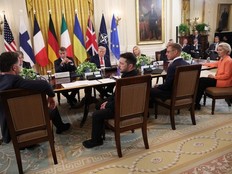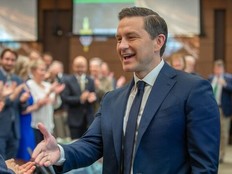Chiefs of Ontario say Ottawa acting unfairly in major projects meeting Thursday

Article content
OTTAWA — The Chiefs of Ontario say Ottawa is levelling an unfair playing field for chiefs in a meeting planned with Prime Minister Mark Carney on Thursday to discuss the government’s controversial major projects legislation.
Carney promised in June that he would meet with First Nations after chiefs said their rights were not respected by the rush to push the bill through Parliament.
Bill C-5, the Building Canada Act, allows cabinet to quickly grant federal approvals for big industrial projects like mines, ports and pipelines by sidestepping existing laws.
An email was sent to chiefs on July 9 opening up registration for the meeting and the Chiefs of Ontario said it was initially able to register chiefs as well as legal advisers, technical and support staff to attend.
But a followup email a few days later confirmed the regional chief’s registration but denied the registration requests for all others.
“It’s disappointing that technical staff, experts and lawyers from organizations and First Nations who were going to attend this meeting were uninvited after they were allowed to register. They all spent money on travel and accommodations to support chiefs during this critical discussion,” the group representing 133 chiefs in the province said in a statement.
“This legislation has the potential to fundamentally change this country and it’s unrealistic and unfair that the government has technical staff and lawyers in the room, but chiefs will not have that support.”
The organization said it spent tens of thousands of dollars on flights and hotels for staff that now won’t be allowed into the meeting.
Carney’s staff have not yet responded to a request for comment from The Canadian Press.
Mohawk Council of Kahnawake Grand Chief Cody Diabo raised similar concerns about the meeting in an interview with The Canadian Press, adding that if Canada uses the meeting to say it has consulted with First Nations, they’ll again find themselves at odds with community.
“Canada wants to do what Canada wants to do,” Diabo said.
He said he doesn’t have much hope for the outcome of the meeting.
“I am going to be pushing to speak at this event and give my stance at it, and I hope for their sake that they don’t try to silence me.”
Other chiefs at multiple press conferences Wednesday also stressed the government should listen to and address their concerns, rather than talk at them.
Ottawa asked First Nations chiefs to submit their questions in advance of the meeting through an online platform by July 16, and gave them the option to vote on which questions will be posed by their peers.
The invitation said that process will help highlight “shared priorities and bring the most pressing issues to the forefront.”
The bulk of the questions posted by Tuesday evening dealt with how the government will respect the rights of First Nations.
“How does your government reconcile Bill C-5’s goal of ‘economic efficiency’ with the constitutional duty to consult and accommodate First Nations under section 35,” reads one question, posed by Chief David Monias of Pimicikamak Cree Nation in Manitoba.
“Is economic streamlining being prioritized over constitutionally protected indigenous rights,” he continued.
On Tuesday nine First Nations in Ontario asked a court to declare as unconstitutional both Ottawa’s Bill C-5, and Bill 5 in Ontario, a similar provincial law meant to fast-track infrastructure projects. They are seeking an injunction to prevent the governments from using some of the most contentious aspects of the bills.
The communities say in the legal challenge filed in the Ontario Superior Court of Justice Tuesday that Bill C-5 and Bill 5 both represent a “clear and present danger” to the First Nations’ self-determination rights to ways of life on their territories.











Postmedia is committed to maintaining a lively but civil forum for discussion. Please keep comments relevant and respectful. Comments may take up to an hour to appear on the site. You will receive an email if there is a reply to your comment, an update to a thread you follow or if a user you follow comments. Visit our Community Guidelines for more information.